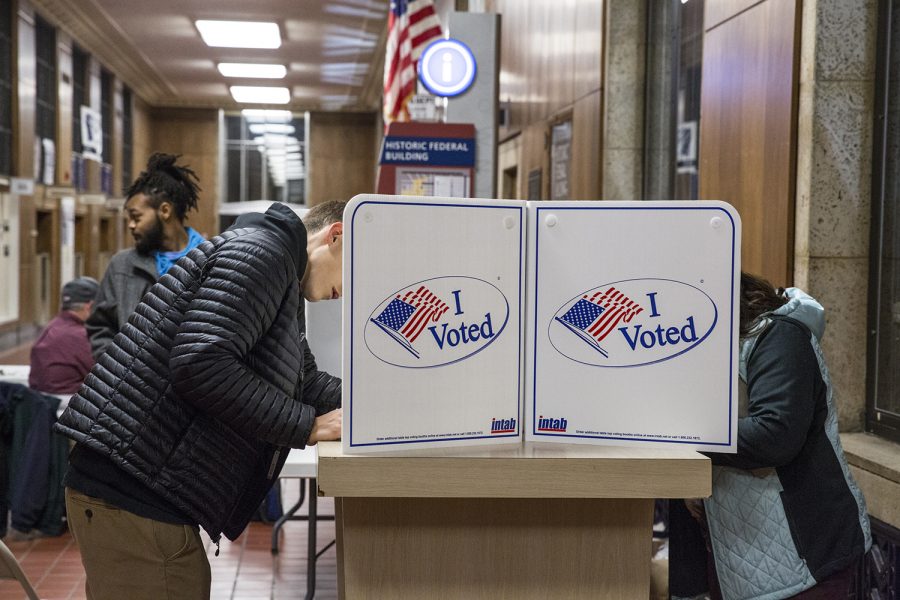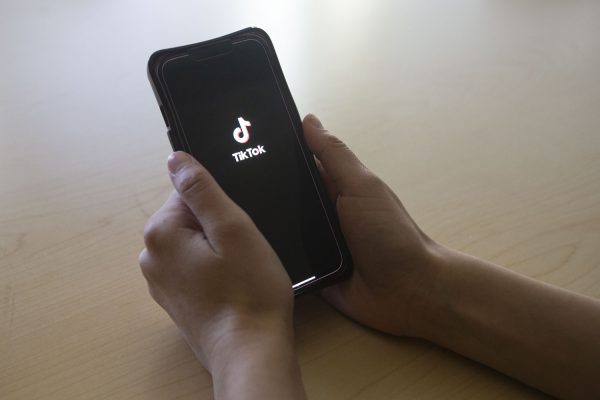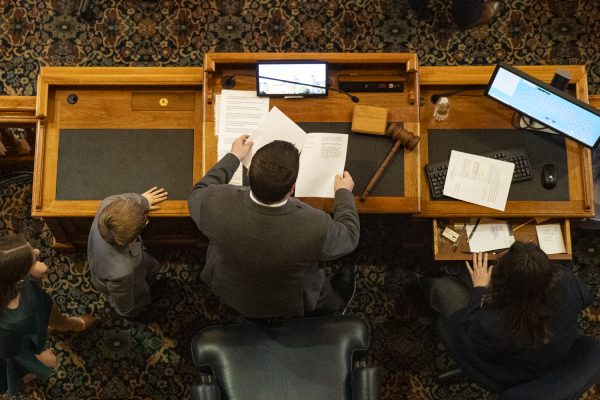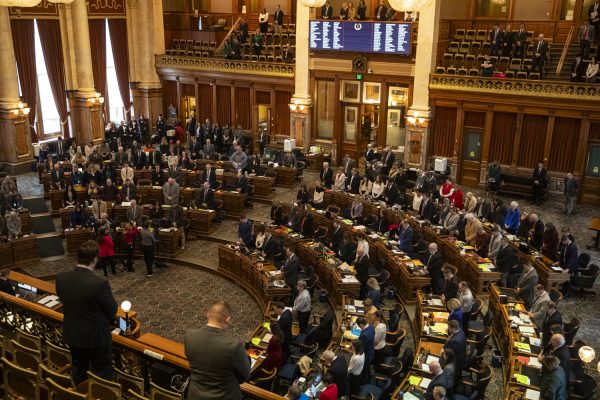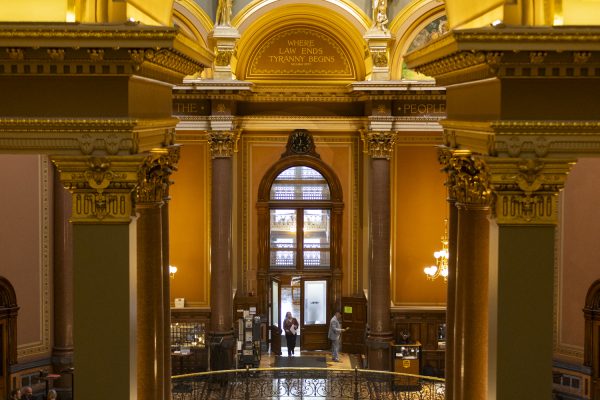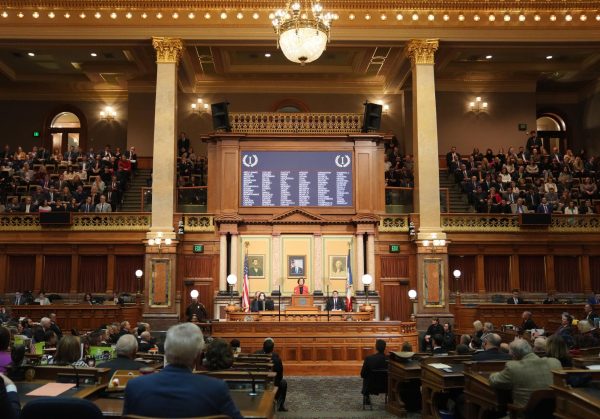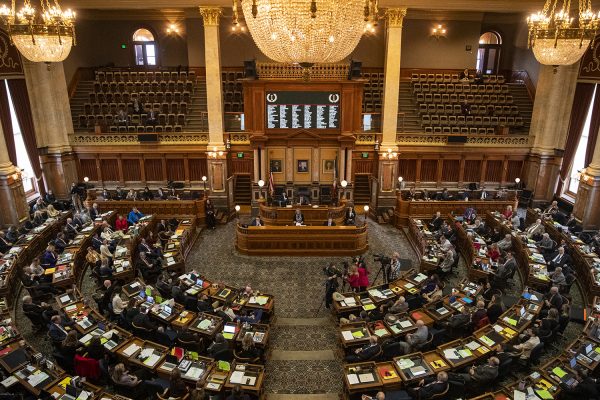Iowans strongly encouraged to vote by mail in June primary, in-person voting still an option
Iowans will cast their ballots in the June 2 primary election — although voters are strongly encouraged to stay home and vote by mail. This could complicate matters for students.
Voters fill out their ballots at a polling location in the Historic Dubuque Federal Building in Dubuque on Tuesday Nov. 6, 2018.
April 28, 2020
Iowa’s primary elections — where voters will choose candidates for the U.S. Senate, House, and Statehouse races — will proceed as scheduled June 2 amid the COVID-19 pandemic, though voters are highly encouraged to cast their ballots through the mail to prevent the spread of the novel coronavirus.
The voting process could become complicated for college students who’ve moved away from their normal registered voting address, and a University of Iowa student group and auditors in student-heavy counties are working to navigate the shift to absentee ballots.
Polls will remain open June 2, but many polling places across the state are being consolidated. A few polling places in Johnson County will be combined, though most will remain open on Election Day.
Every registered voter will receive an absentee ballot-request form from the Iowa Secretary of State’s office to encourage voting by mail. Mailing of the forms began April 23, and voters should expect to receive their ballot-request form sometime this week. Absentee ballot-request forms must be received by the county Auditor’s Office by 5 p.m. May 22.
Though all registered voters should receive a ballot-request form in the mail, the form might not find its way to college students who’ve left their registered voting address.
Jocelyn Roof, founder of nonpartisan UI student group Hawk the Vote, has been mailing absentee ballot-request forms to students residing away from the address at which they are registered to vote.
“A lot of folks’ forms are being sent out to places where students no longer are, especially students who are living in the residence halls — the residence halls are going to get a ton of those requests that are not forwardable,” Roof said. “All of those students are going to have to figure out how to get an absentee-request form on their own.”
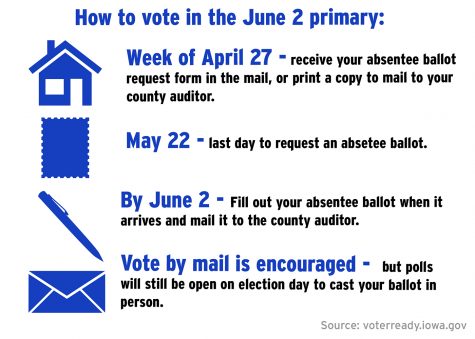
Hawk the Vote created an online form to help students determine if they need to obtain their own absentee ballot-request form.
Although voters who cannot receive a ballot-request form in the mail can print a copy from the Iowa Secretary of State’s website, Roof said many students do not have access to a printer at home and printing at the library is no longer an option.
After turning in the absentee ballot-request form, voters must also mail the ballot or drop it off at their county Auditor’s Office by June 2.
“You’re getting a form to request another form, and you have to send both of them back, so I think that definitely can be confusing,” Roof said. “I think some people think that getting an absentee ballot-request form is like getting their absentee ballot, when they’re actually two different things. We’re trying to clarify that as much as possible.”
Black Hawk County Auditor Grant Veeder said Iowa law currently prevents voters from receiving a mail-in ballot without requesting one first.
“Hopefully someday it will be like some of the other states where they mail out ballots to all registered voters,” Veeder said. “I’m certainly in favor of that happening in Iowa, but we haven’t had much success pushing that. Maybe some of that will change as a result of the current crisis.”
Colorado, Hawaii, Oregon, Washington, and Utah are conducting elections entirely by mail this year and don’t require voters to turn in a request form.
Kevin Hall, a spokesperson for the Iowa Secretary of State’s Office, told the Des Moines Register that mailing ballots to voters who have not requested them could present threats to election security.
On Tuesday, Weipert said his office had received between 2,000 and 3,000 ballot-request forms.
Johnson County Auditor Travis Weipert said that if students are looking to register to vote before the primary, they should register sooner rather than later.
The Iowa Secretary of State website lists May 18 as the worry-free postmark date for voter registrations. Voters can register after this date, but it is not guaranteed the registration will be processed and received in time for Election Day. Voters can also register online if they have an Iowa driver’s license.
Weipert said turnout in Johnson County for primary elections is lower among the student population. In 2018, nearly 14 percent of registered voters statewide participated in the June primary elections, and around 5 percent of registered voters ages 18-24 participating.
Turnout levels were higher in Johnson County with around 17 percent of registered voters casting a ballot and around 7 percent of voters ages 18-24 participated.
“You always want the students to participate,” Weipert said. “When it comes to primary elections, the student turnout is really poor. We’ll do everything we can. We’re working with the university to make sure students receive their request forms, but if you know somebody who is concerned they might not receive it, just go to our website, print it off, and turn it in.”



